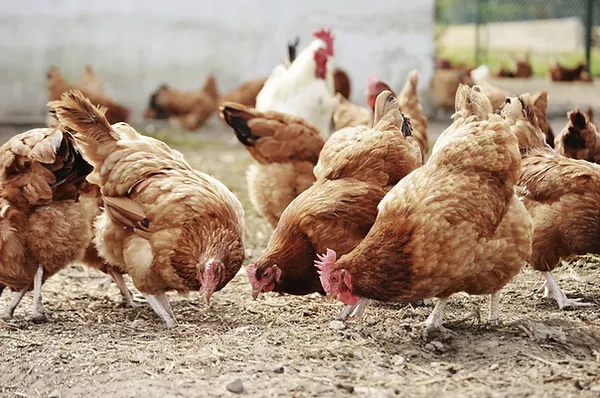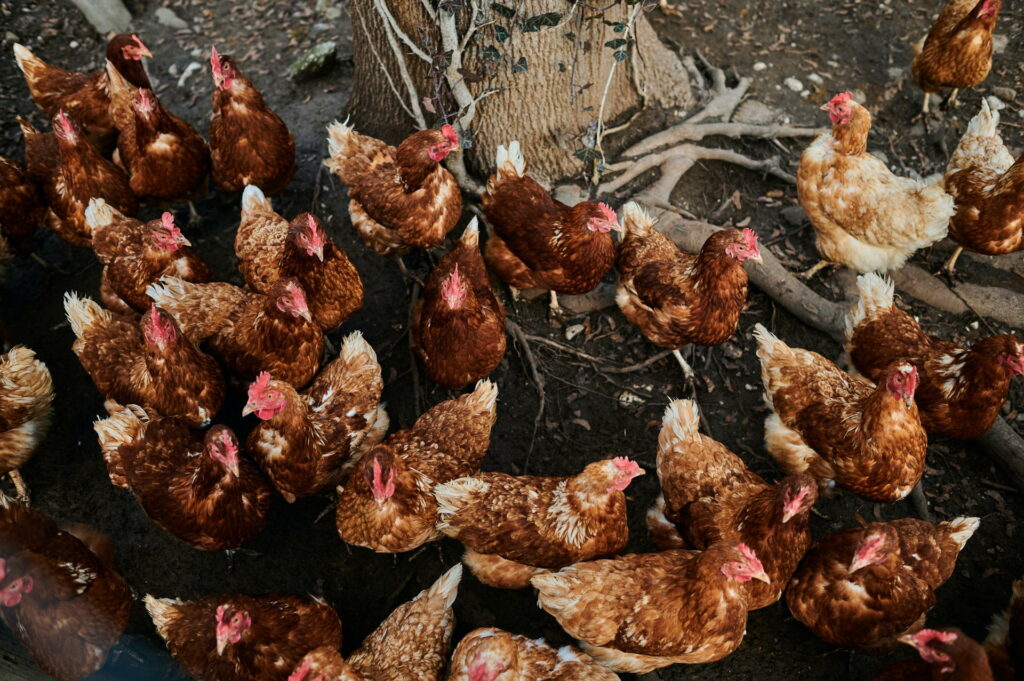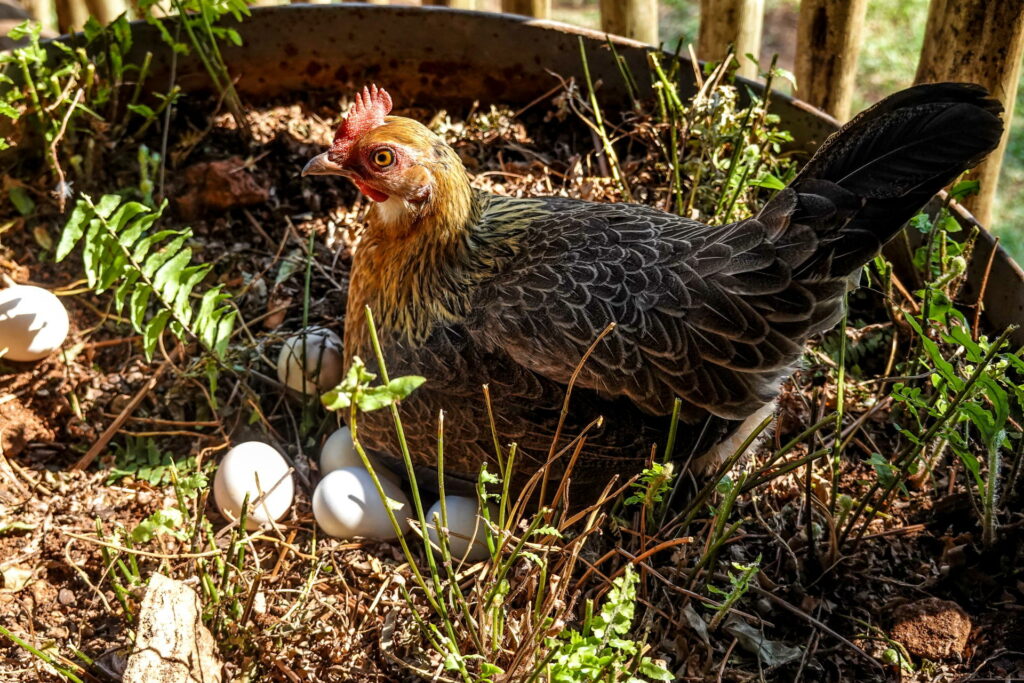Chicken Care
Having laying hens as part of your backyard can be very rewarding. They provide eggs for cakes, lovely manure for the veggie garden and make delightful pets. However, many owners find it difficult to know how to best care for their chickens especially when they become sick. For the inexperienced poultry keeper or those that are interested in having backyard poultry, there are a few considerations to keep your birds happy and healthy.
What are the local council restrictions?
Council regulations state that poultry must be kept at least 4.5m away from any area that is used for the manufacture, preparation, storage or cooking of food. Suburban homes will face restrictions on the number of birds and are typically unable to keep a rooster due to noise. Rural or semi-rural homes will have access to a greater number of birds.
How should I house my chickens?
Housing should provide your birds with shelter from wind, rain and sun as well as protection from predators such as foxes, cats, dogs and birds of prey. An enclosure usually contains a chicken coop used for roosting, shelter and nest boxes for laying eggs. Strong wire netting is required to keep predators out and chickens in. This may include a netted roof to avoid aerial predators and foxes. Access to free range in the backyard is possible in the daytime, but chickens should be locked up at night to keep them safe. The chicken coop must be able to provide a perch to sleep on, set approximately 30cm above the ground. Laying boxes made of plastic are more easily disinfected and will not harbour parasites like wooden boxes. Straw is typically the best substrate for the laying box. We would not recommend straw as coop bedding as it absorbs moisture and may encourage mice and other pests. Chicken coops may be purpose built, a converted shed, or purchased from a pet store.
The NSW Department of Primary Industries publishes a guide on how to build a chook house. This guide may be purchased from the following link: https://www.tocal.nsw.edu.au/publications/list/animals/poultry-penthouse
The NSW Department of Primary Industries publishes a guide on how to build a chook house. This guide may be purchased from the following link: https://www.tocal.nsw.edu.au/publications/list/animals/poultry-penthouse
What should I feed my chickens?
A nutritious diet is very important to keep your backyard birds healthy and in lay. Your birds will require 24-hour access to fresh clean water. We recommend using water dispensers to avoid fouling open pans or dishes with ground litter and waste.
It is important to feed your birds the right diet for their particular life stage. Birds 1-6 weeks of age require a starter feed that is higher in protein. Grower feed is provided from 6 weeks of age and continued until they come into lay at 18-24 weeks of age.
Once they come into lay, chickens have a higher calcium requirement. Feeding layer pellets as the major component of your hens’ diet is the best way to keep your birds healthy and in lay. Table and vegetable scraps should NOT be the main component of their diet. When feeding scraps, SHELL GRIT is added as it contains calcium carbonate. Calcium is vital in order to produce good quality shells for your eggs.
A scratch (grain) mix should not be the primary component of your chickens’ diet as it is NOT balanced for laying birds. It is high in energy and tastes great but will NOT provide the correct amount of CALCIUM, minerals, vitamins and protein to maintain good health. Grain may be fed as a treat to your birds to get them in to their pen at night and increase bonding between you and your chickens! And yes, positive reinforcement training can be used in chickens too!
It is important to feed your birds the right diet for their particular life stage. Birds 1-6 weeks of age require a starter feed that is higher in protein. Grower feed is provided from 6 weeks of age and continued until they come into lay at 18-24 weeks of age.
Once they come into lay, chickens have a higher calcium requirement. Feeding layer pellets as the major component of your hens’ diet is the best way to keep your birds healthy and in lay. Table and vegetable scraps should NOT be the main component of their diet. When feeding scraps, SHELL GRIT is added as it contains calcium carbonate. Calcium is vital in order to produce good quality shells for your eggs.
A scratch (grain) mix should not be the primary component of your chickens’ diet as it is NOT balanced for laying birds. It is high in energy and tastes great but will NOT provide the correct amount of CALCIUM, minerals, vitamins and protein to maintain good health. Grain may be fed as a treat to your birds to get them in to their pen at night and increase bonding between you and your chickens! And yes, positive reinforcement training can be used in chickens too!
What diseases might my chickens get and what signs should I look for?
Common clinical signs that sick chickens display include weight loss, inappetence, shallow breathing, a pale comb or wattle, lethargy and diarrhoea. Chickens are susceptible to a range of diseases but the most common ones to look out for are:
- Internal parasites such as gastrointestinal worms and coccidia. Gastrointestinal worms can be treated by using a wormer that is given in their drinking water ( no egg withholding period) or an individual tablet. Worming tablets are not licensed for use in food producing birds. Coccidiosis is a protozoal infection that can be life threatening in chickens and requires specific drugs to treat. A faecal test is used to diagnose coccidiosis and can be performed at Albion Park and Gerringong Veterinary Hospitals.
- External parasites such as lice, scaly leg mite and red mite can live on your birds’ skin, feathers and in their bedding and coops. They can be difficult to eradicate. Symptoms include poor feathering, poor egg production, scabbing of the skin of the feet and pale combs or wattles. Treatment can include powders such as Pestene, use of diatomaceous earth (DE) or oral medications prescribed by your veterinarian.
- Gastrointestinal disease such as gastroenteritis. This can have variety of causes and symptoms include in appetence, lethargy and diarrhoea.
- Respiratory disease such are upper and lower respiratory tract infections. Affected birds will typically show symptoms such as difficulty breathing, nasal or ocular discharge, discoloured wattle or combs.
- Reproductive disease such as becoming egg bound. Symptoms include in appetence, a hard swollen abdomen, difficulty breathing or walking as well as a pale comb or wattle.
Do my chickens need regular health treatments?
Backyard chickens are relatively low maintenance animals but this depends on the number of birds kept, how they are housed and the stocking density. We recommend free ranging birds are wormed every 3 months to keep them free of internal parasites. Monitor your birds for visible signs of lice and mites and use powders such as Pestene every 3 months or when required.
Keeping housing and bedding clean by changing it regularly will help you monitor for signs of disease. Water and feed dispensers must be kept clean by washing with hot soapy water. Gravel may be used as a substrate in areas of the enclosure that may become damp around water dispensers. We recommend regular faecal screening to monitor your flock for parasites as well as the presence of coccidia in your birds. This can be done by bringing in a faecal sample to the clinic.
Keeping housing and bedding clean by changing it regularly will help you monitor for signs of disease. Water and feed dispensers must be kept clean by washing with hot soapy water. Gravel may be used as a substrate in areas of the enclosure that may become damp around water dispensers. We recommend regular faecal screening to monitor your flock for parasites as well as the presence of coccidia in your birds. This can be done by bringing in a faecal sample to the clinic.
What about withholding periods (WHPs)?
If you use a product licenced for use in food producing poultry it will have a withholding period (WHP) for laying birds (eggs) and a WHP for birds intended for meat. The egg WHP is the amount of time that must pass between using the veterinary or agricultural product and the bird being able to produce eggs fit for human consumption. An egg WHP of 3 days means that you have to wait 3 days between the last use of the product and being able to consume or sell the eggs from the treated animals.Depending on the disease and number of birds to be treated, your veterinarian may decide to use an off label treatment with a drug not licenced for use in poultry. If this is the case, your veterinarian will discuss any possible risks and will set a longer WHP to help minimise the risk of any detectable or unsafe residues in eggs produced after the treatment. If you have any questions regarding backyard poultry, please don’t hesitate to contact us at Albion Park and Gerringong Veterinary Hospitals.



